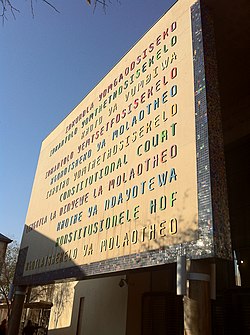Majority judgment
In his majority judgment, Ngcobo held that section 72(1)(a) and similar provisions should be interpreted in light of the principles of South African democracy, which he viewed as a participatory democracy as well as a representative democracy. The Constitution granted the legislature "considerable discretion in determining how best to achieve this balanced relationship" between the democracy's representative and participatory elements, but it also obliged the Constitutional Court to intervene – even at the cost of impinging on legislative autonomy – when Parliament failed to fulfil a constitutional obligation.
In Ngcobo's interpretation, section 72(1)(a) requires that the NCOP should have "taken steps to afford the public a reasonable opportunity to participate effectively in the law-making process" and thus "a meaningful opportunity to be heard in the making of the laws that will govern them". This includes extending opportunities for such participation, such as by soliciting oral and written submissions from the public, and taking "measures to ensure that people have the ability to take advantage of the opportunities provided", such as by providing adequate notice, information, and political education.
In deciding whether the legislature had complied with its section 72(1)(a) obligation, Ngcobo found that the court's task was to determine whether the legislature had taken reasonable steps, in the circumstances, to facilitate effective public participation, with reference to such factors as parliamentary rules, the nature and urgency of the bills under consideration, and "practicalities such as time and expense". Ngcobo viewed the reasonableness standard as the best way for the courts to "balance, on the one hand, the need to respect parliamentary institutional autonomy, and on the other, the right of the public to participate in public affairs". Using this standard, he found that the NCOP's process in respect of the Dental Technicians Amendment Act had been reasonable, because there had been little evidence of public interest in the legislation. By contrast, there was a great deal of public interest in the Choice on Termination of Pregnancy Amendment Act and the Traditional Health Practitioners Act; in failing to solicit public submissions on those two laws, the NCOP had failed to fulfil its duty to take reasonable steps to facilitate public involvement in the laws' passage.
The Sterilisation Amendment Act was excluded from consideration because it had not been signed into law at the time that Doctors for Life launched the proceedings; the court held that it was not competent to grant relief in relation to bills before they were assented to by the President.
Dissenting judgment
Yacoob's dissent turned on a narrower examination of the meaning of the constitutional directive to "facilitate public involvement in... legislative and other processes". Based on an analysis of the Constitution's use of the words "participate" and "participation", he concluded that "public involvement", as envisaged in section 72(1)(a), is distinct from, and means "something less than", direct public participation. Indeed, given that the provision requires public involvement in "legislative and other processes" broadly, a stronger interpretation would have absurd consequences: it would clearly be untenable for the public to be directly involved in every process of the legislature, such as the election of the President (an indirect election in terms of the Constitution) or of presiding officers.
On the whole, the language of section 72(1)(a) cannot sensibly be construed as requiring that the public must be given an opportunity to comment on draft legislation. Even the implication that Parliament is required to take "reasonable steps" to facilitate public involvement would be too strong: the provision was carefully drafted at a high level of generality. And it was still more strained to infer that either public participation or public involvement was a constitutional pre-requisite to the passage of valid legislation, given that other sections of the Constitution provided a detailed synopsis of the legislative process without referring to any mandatory consultation stage.
More broadly, Yacoob argued that direct public involvement in the legislative process was not a pre-requisite for participatory democracy. Further, the importance of representative democracy should not be understated: "Constitutionally speaking, it is the people of our country who, through their elected representatives pass laws". The majority's interpretation of section 72(1)(a) thus imposed a significant "limitation on the power of elected representatives of the people to make law", which in turn undermined the public's political rights.
